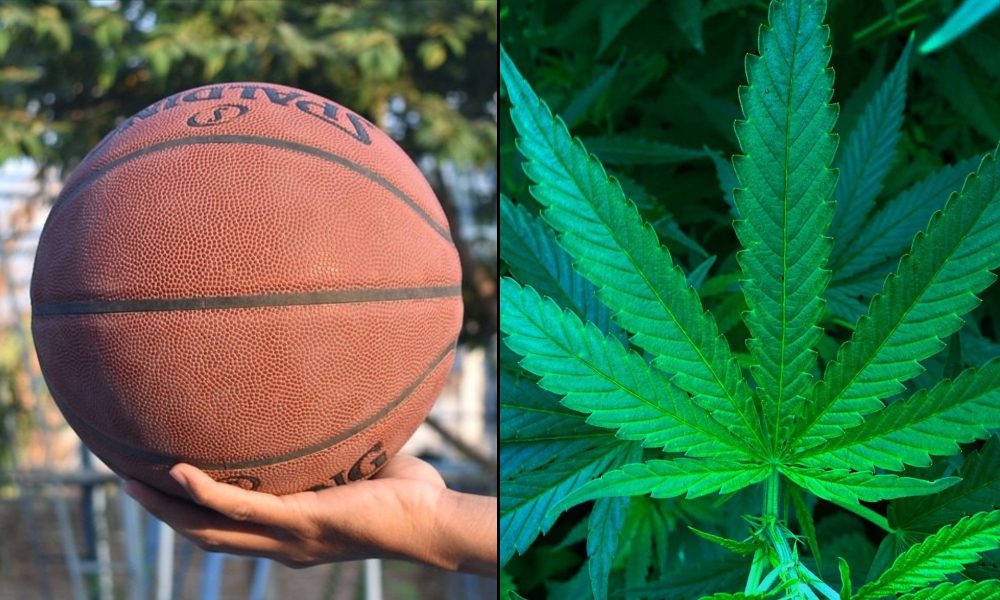The National Basketball Association (NBA) is reportedly removing marijuana from its list of banned substances and will no longer drug test players for it as part of a new seven-year collective bargaining agreement.
The move, first reported on Saturday by Shams Charania of The Athletic and Stadium, formally codifies what has been the league’s decision to temporarily suspend cannabis testing for the past three seasons.
Sources: NBA players will no longer be prohibited for marijuana under the new seven-year Collective Bargaining Agreement. It’s been removed from the anti-drug testing program, a process that began during 2019-20 season.
— Shams Charania (@ShamsCharania) April 1, 2023
NBA Commissioner Adam Silver signaled in late 2020 that the policy could eventually become permanent after the league initially suspended cannabis testing when players competed in a quarantined “bubble” in Orlando at the start of the coronavirus pandemic earlier that year.
“We decided that, given all the things that were happening in society, given all the pressures and stress that players were under, that we didn’t need to act as Big Brother right now,” he said at the time. “I think society’s views around marijuana has changed to a certain extent.”
Rather than mandate blanket tests, the commissioner said the league would be reaching out to players who show signs of problematic dependency, not those who are “using marijuana casually.”
Now, according to Charania, “NBA players will no longer be prohibited for marijuana under the new seven-year Collective Bargaining Agreement.”
“It’s been removed from the anti-drug testing program, a process that began during 2019-20 season,” he reported.
NBA and the National Basketball Players Association announced earlier on Saturday that they “reached a tentative agreement on a new Collective Bargaining Agreement, pending ratification by players and team governors,” but that details won’t be released until a term sheet is finalized.
The following has just been released: pic.twitter.com/Tf8NDvi0TE
— NBA Communications (@NBAPR) April 1, 2023
Michele Roberts, a onetime head of the National Basketball Players Association (NBPA) who also joined the board of the major cannabis company Cresco Labs in 2020, previously predicted that a formal change to codify the policy could come soon.
In 2021, it was announced that the online marijuana marketplace Weedmaps is teaming up with NBA star Kevin Durant for a multi-year partnership that’s aimed at destigmatizing cannabis and showcasing the plant’s potential value for “athlete wellness and recovery.”
This latest action from NBA comes as the national discussion about cannabis testing policies for athletes continues to unfold—an issue that made international headlines following the suspension of U.S. runner Sha’Carri Richardson from participating in the Olympics over a positive THC test.
The runner said that she’d feel “blessed and proud” if the attention her case raised would affect a policy change for other athletes. Even the White House and President Joe Biden himself weighed in on the case, suggesting that there’s a question about whether the marijuana ban should “remain the rules.”
However, the World Anti-Doping Agency (WADA) decided last year to keep marijuana on the list of banned substances for international athletes following a scientific review and a determination that cannabis use “violates the spirit of sport.”
MLB, one of the most progressive professional sports leagues when it comes to cannabis policy, recently signed a CBD company to serve as the league’s first-ever cannabis sponsor—with plans to promote the business at the upcoming World Series.
The decision came about four months after it was reported that MLB started allowing baseball teams in the league to sell sponsorships to cannabis companies that market CBD products, as long as they meet certain criteria.
MLB has stood out among other professional sports leagues as more willing to respond to the changing marijuana policy landscape. For example, it clarified in a memo in 2020 that players will not be punished for using cannabis while they aren’t working, but they can’t be personally sponsored by a marijuana company or hold investments in the industry.
The league also said at the time that it was teaming with NSF International to analyze and certify legal, contaminant-free CBD products in order to allow teams to store them on club premises.
The update built upon MLB’s decision in 2019 to remove cannabis from the league’s list of banned substances. Before that rule change, players who tested positive for THC were referred to mandatory treatment, and failure to comply carried a fine of up to $35,000. That penalty is now gone.
A number of athletic governance bodies have recently relaxed rules around cannabinoids as laws change and medical applications become more widely accepted.
UFC announced in 2021 that they would no longer be punishing fighters over positive marijuana tests.
Separately, students athletes that are part of the NCAA would no longer automatically lose their eligibility to play following a positive marijuana test under rules that are were recommended by a key committee last year.
Meanwhile, the NFL’s drug testing policy already changed demonstrably in 2020 as part of a collective bargaining agreement.
NFL players no longer face the possibility of being suspended from games over positive tests for any drug—not just marijuana—under a collective bargaining agreement. Instead, they will face a fine. The threshold for what constitutes a positive THC test was also increased under the deal.
Marijuana icon Snoop Dogg, who was featured at the Super Bowl halftime show last year where an ad separately aired that indirectly supported legalization, argued that sports leagues need to stop testing players for marijuana and allow to them to use it as an alternative to prescription opioids.
Cannabis and sports was also a topic of discussion amid the detention of U.S. basketball player Brittney Griner in Russia over THC vapes.
Kentucky Governor Signs Medical Marijuana Legalization Bill Into Law
Read the full article here









